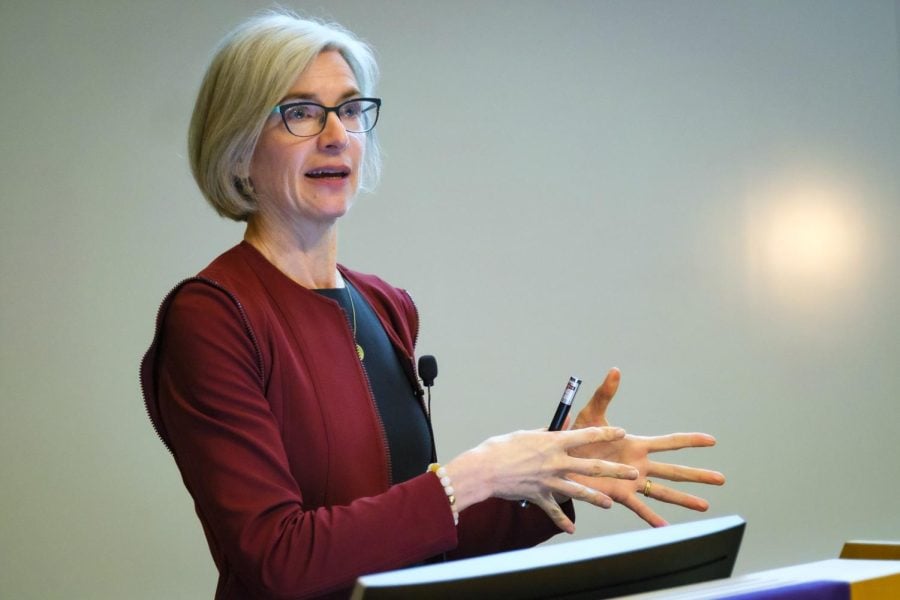Biochemist Jennifer Doudna receives Kimberly Prize for role in CRISPR studies
Photo courtesy of Northwestern University
Biochemist Jennifer Doudna was recognized for her outstanding research contributions because she co-developed CRISPR, a precise gene editing tool with widespread impact.
April 5, 2023
Biochemist Jennifer Doudna received the inaugural Kimberly Prize in Biochemistry and Molecular Genetics at the Robert H. Lurie Medical Research Center on Tuesday. The prize will be awarded annually to a scientist who has made “outstanding research contributions into the molecular basis of life with a direct demonstrated link of their discovery into clinic for the betterment of humankind.”
Trustee Kimberly Querrey funded the award in honor of her late husband, Louis Simpson, who was a university benefactor. The prize of $250,000 is the largest biochemistry prize in the U.S., awarded by the Simpson Querrey Institute for Epigenetics and administered by the Feinberg School of Medicine. The recipient is required to give a lecture on their work after accepting the award.
“The prize celebrates Louis Simpson and his contribution to both Northwestern and Northwestern medicine,” said Ali Shilatifard, director of the Simpson Querrey Institute. “Louis was very big on the idea that what you do, develop or discover should affect others positively.”
Doudna co-developed CRISPR/Cas9, a technology which can alter DNA with significant precision, and was awarded the 2020 Nobel Prize in Chemistry alongside Emmanuelle Charpentier for her work. CRISPR, which stands for clustered repeating interspaced short palindromic repeats, is a “bacterial immune system,” as Doudna describes.
Doudna has continued her work on the CRISPR/Cas9 system beyond Cas9 since 2020, and helped found a genome institute at the University of California, Berkeley in collaboration with the University of California, San Francisco.
Shilatifard, who is also the chair of Feinberg’s biochemistry and molecular genetics department, said Doudna’s research changed the world. If there is a mutation that causes a disease, he said, CRISPR could help scientists correct it — something that wasn’t possible before.
“Five hundred years from today, people will remember Einstein, Darwin, Watson, Crick, Curie … and Doudna,” Shilatifard said. “I think her discovery is probably much more impactful than the rest of them.”
While introducing Doudna to the crowd of over 800 people, Shilatifard recalled meeting Jennifer in the early 2000s at a tapas restaurant. Doudna seemed like someone who was full of ideas and had a remarkable enthusiasm for science from the start, he said.
After accepting the award, Doudna described her journey with CRISPR and shared two unpublished stories from her lab, highlighting her newest findings in CRISPR delivery and precision.
She said she still remembers the day when her team, looking over a lightbox at different-sized DNA fragments in their lab, realized how enzymes can be programmed to cut at a specific place in the DNA.
“That was the moment Martin (Jinek) and I looked at each other and said, “Wow, we have this one enzyme, we can program it to cut DNA wherever we want,’” Doudna said. “That was really interesting from a biological point of view, because it told us a lot about how bacteria used the system as a programmable immune system.”
Third-year Driskill Graduate Program in Life Sciences Ph.D. student Daphne Cornish, who attended the lecture, uses CRISPR on a regular basis in the lab.
Hearing Doudna’s story in her own words was powerful, Cornish said.
“Being able to see kind of where this all started, all the way to where it’s going in the future, it’s been really cool,” Cornish said.
Doudna emphasized this is an exciting time for her field of research because genome-editing carries real impact –– especially in developing medicine to cure diseases. As a biochemist, Doudna said she is fascinated by the innovative technology.
“It’s powerful,” Doudna said. “Over the last decade or so, (genome editing) has been developed for not only disrupting genes or replacing genes, but also for controlling transcription — meaning controlling the output of genes.”
But, Doudna said her background in biochemistry didn’t prepare her for challenges in applying her research in treatment options. Researchers need to consider the delivery of genome editors, because CRISPR has the potential to be a “one-and-done” type of therapy for human bodies, she said.
It’s one thing to use this technology in a laboratory, where scientists can introduce genome editors into cells growing on a dish. But it’s different when it comes to a human body, she said.
“We want to ensure these editors go to the right cells and the right organ and make the right change,” Doudna said. “We’re excited about the way that we can understand the pathways to delivery and precision editing — these are essential for the future of the field.”
Email: [email protected]
Twitter: @noracollins02
Email: [email protected]
Twitter: @JessicaMa2025
Related Stories:
— Northwestern Trustees Lou Simpson and Kimberly Querrey donate $10 million for bioelectrics research
— Kimberly Querrey gifts $121 million to NU to support research, biomedical discovery
— Feinberg receives $10 million to develop treatments for neurological diseases












